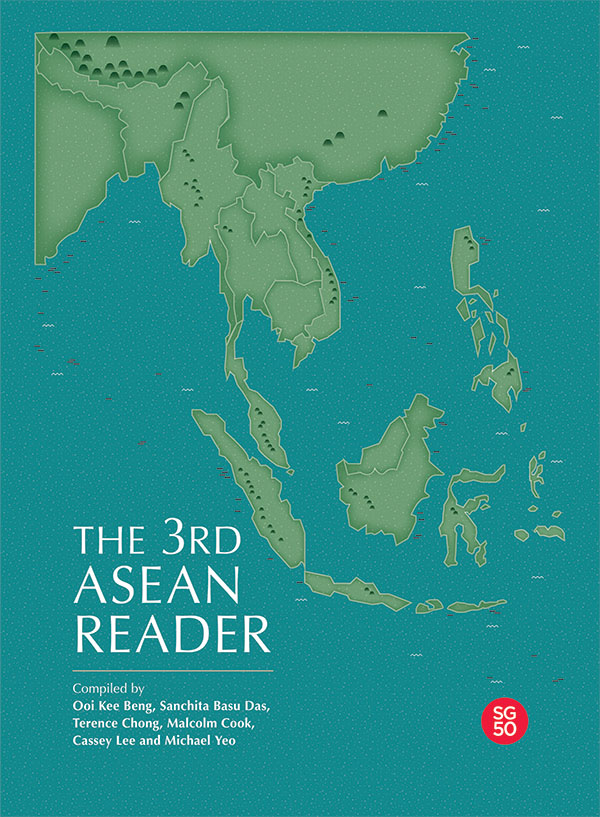Book contents
- Frontmatter
- Contents
- Preface
- Forewords to the First and Second ASEAN Reader: ASEAN: Conception and Evolution
- Forewords to the First and Second ASEAN Reader: ASEAN: The Way Ahead
- Forewords to the First and Second ASEAN Reader: New Challenges for ASEAN
- SECTION I ASEAN: THE LONG VIEW
- SECTION II COUNTRY ANALYSES
- SECTION III COMPARATIVE ANALYSES OF THE REGION
- Southeast Asian Societies
- The Southeast Asian Economy
- Southeast Asian Politics
- SECTION IV INTERNATIONAL DEVELOPMENTS
- SECTION V INSTITUTIONS OF ASEAN
- SECTION VI ASSESSING ASEAN'S INTERNAL POLICIES
- ASEAN Political Security Community
- ASEAN Economic Community
- ASEAN Socio-Cultural Community
- SECTION VII ASSESSING ASEAN'S EXTERNAL INITIATIVES
- ASEAN Processes
- 61 Driving East Asian Regionalism: The Reconstruction of ASEAN's Identity
- 62 Pakistan, SAARC and ASEAN Relations
- 63 Neither Skepticism nor Romanticism: The ASEAN Regional Forum as a Solution for the Asia-Pacific Assurance Game
- 64 ASEAN Plus Three and the Rise of Reactionary Regionalism
- 65 How the East Asia Summit Can Achieve its Potential
- 66 ‘Talking Their Walk’? The Evolution of Defense Regionalism in Southeast Asia
- 67 ASEAN FTAs: State of Play and Outlook for ASEAN's Regional and Global Integration
- 68 Taking ASEAN+1 FTAs Towards the RCEP
- 69 RCEP and TPP: Comparisons and Concerns
- 70 Enhancing the Effectiveness of CMIM and AMRO: Selected Immediate Challenges and Tasks
- ASEAN's Major Power Relations
- SECTION VIII SOUTHEAST ASIA: PERIPHERAL NO MORE
- Bibliography
- The Contributors
- The Compilers
66 - ‘Talking Their Walk’? The Evolution of Defense Regionalism in Southeast Asia
from ASEAN Processes
Published online by Cambridge University Press: 22 June 2017
- Frontmatter
- Contents
- Preface
- Forewords to the First and Second ASEAN Reader: ASEAN: Conception and Evolution
- Forewords to the First and Second ASEAN Reader: ASEAN: The Way Ahead
- Forewords to the First and Second ASEAN Reader: New Challenges for ASEAN
- SECTION I ASEAN: THE LONG VIEW
- SECTION II COUNTRY ANALYSES
- SECTION III COMPARATIVE ANALYSES OF THE REGION
- Southeast Asian Societies
- The Southeast Asian Economy
- Southeast Asian Politics
- SECTION IV INTERNATIONAL DEVELOPMENTS
- SECTION V INSTITUTIONS OF ASEAN
- SECTION VI ASSESSING ASEAN'S INTERNAL POLICIES
- ASEAN Political Security Community
- ASEAN Economic Community
- ASEAN Socio-Cultural Community
- SECTION VII ASSESSING ASEAN'S EXTERNAL INITIATIVES
- ASEAN Processes
- 61 Driving East Asian Regionalism: The Reconstruction of ASEAN's Identity
- 62 Pakistan, SAARC and ASEAN Relations
- 63 Neither Skepticism nor Romanticism: The ASEAN Regional Forum as a Solution for the Asia-Pacific Assurance Game
- 64 ASEAN Plus Three and the Rise of Reactionary Regionalism
- 65 How the East Asia Summit Can Achieve its Potential
- 66 ‘Talking Their Walk’? The Evolution of Defense Regionalism in Southeast Asia
- 67 ASEAN FTAs: State of Play and Outlook for ASEAN's Regional and Global Integration
- 68 Taking ASEAN+1 FTAs Towards the RCEP
- 69 RCEP and TPP: Comparisons and Concerns
- 70 Enhancing the Effectiveness of CMIM and AMRO: Selected Immediate Challenges and Tasks
- ASEAN's Major Power Relations
- SECTION VIII SOUTHEAST ASIA: PERIPHERAL NO MORE
- Bibliography
- The Contributors
- The Compilers
Summary
Historically an ad hoc, uneven, and for the most part uncoordinated process, Southeast Asian defense cooperation has evolved incrementally from bilateral efforts to the incorporation of multilateral initiatives including ministerial-level meetings. With unresolved territorial disputes and residual mistrust continuing to color intramural relations despite more than four decades of regionalism, the aims of Southeast Asian defense collaboration have understandably remained limited, focused as they have been on informal confidence building, trust creation, mutual reassurance, and where conditions have permitted, embryonic preventive diplomacy. In riposte to a host of nonconventional (or nontraditional) challenges that partly define the contemporary security milieu in Southeast Asia, defense cooperation has expanded beyond dialogical activity to include practical and actionable responses to natural and humanitarian disasters, challenges in the maritime domain, international terrorism, pandemic outbreaks, and the like. The ASEAN Defense Ministers Meeting (ADMM) framework, for example, is designed to facilitate the upgrading of national and regional capacities for managing specific nonconventional security problems, many of which are transnational in character. However, the inclusion of this “operational” element by no means indicates that ASEAN is ready to formally embrace preventive diplomacy, even less conflict resolution, in any systematic or substantive way. If anything, contrary to past ASEAN practice, the deliberate avoidance of grandiloquent gestures in the ADMM's narrowly defined remit arguably reflects the desire among ASEAN's defense practitioners to “talk their walk” — exercise a visionary restraint that is more or less commensurate to actual practice — rather than attempting, and likely failing, to walk their talk.
DEFENSE REGIONALISM IN SOUTHEAST ASIA
In May 2006 in Kuala Lumpur, Malaysia, ASEAN leaders inaugurated the ADMM. The development marked a departure of sorts from the way Southeast Asian states had until then engaged in regional defense cooperation. Four years later in Hanoi, Vietnam, ASEAN leaders launched the ADMM+ grouping composed of defense ministers from the ASEAN countries and eight of the regional organization's dialogue partner nations. For many, the establishment of these forums is no less remarkable especially for a region for which the categorical rejection of collective defense, whether with or without the great powers, has long been a sine qua non of regional organization. The existence of the ADMM and its extraregional appendage reveal a contemporary Southeast Asia not loath to institutionalized multilateral defense dialogue and cooperation at the highest levels with major military powers.
- Type
- Chapter
- Information
- The 3rd ASEAN Reader , pp. 347 - 351Publisher: ISEAS–Yusof Ishak InstitutePrint publication year: 2015



